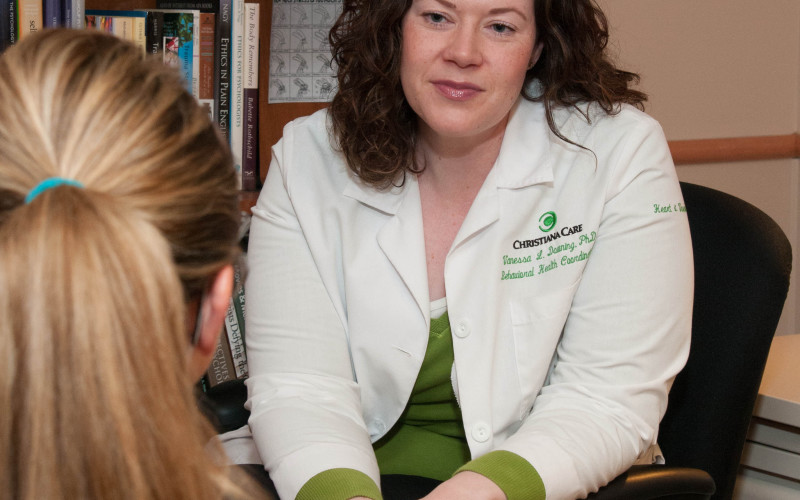Cardiovascular psychologist helps heart and vascular patients

Vanessa Downing, Ph.D., a cardiovascular psychologist, joined the Center for Heart & Vascular Health in 2008, bringing ready access to behavioral health services to cardiovascular patients. In this Q&A, she talks about how behavioral health is an important component of cardiovascular health care.
Q. What inspired the behavioral health program at the Center for Heart & Vascular Health?

A. The American College of Cardiology in 2008 published a research review that identified depression as a major indicator for heart disease and suggested that cardiologists screen patients for depression. Christiana Care’s forward-thinking response was to take it a step further and embed a cardiovascular psychologist at the Center for Heart & Vascular Health to help patients, and to educate the staff and community about behavioral health and cardiovascular conditions.
I see a wide variety of inpatients facing acute and chronic diagnoses — including heart attack, congestive heart failure and amputation as a result of vascular disease. I see patients when they are waiting for test results or about to have important diagnostic or surgical procedures. I encourage the physicians I work with to consult behavioral health for all sorts of patients — those already living with mental-health diagnoses or those who need help coping with a significant new challenge.
I also focus on outpatients and optimizing health, helping patients get their arms around what their illness is and identifying areas where they might improve their control and influence. We talk about what life was like before their diagnosis, what their strengths and resources are, and explore some of their fears — what they can’t control and where they might have some real uncertainties. What starts as trust-building quickly becomes an alliance focused on improving health by changing outlooks and behaviors such as exercising and not smoking.
Q: What are the most common behavioral health issues for cardiovascular patients?
A: The most common issues are depression, anxiety and adjusting to the new reality and identity changes that go along with having a serious diagnosis. For one person, that can look a lot like grief — crying or sleeping all the time. But for others, constant worry can feel like an invader. We see all kinds of issues, because there are all sorts of people diagnosed with cardiovascular disease and many ways to cope.
Q: You provide psychological screenings for patients considering a left ventricular assist device (LVAD). Why is this necessary?
A: Living with an LVAD is life-changing. Patients sometimes have understandable ambivalence about whether it’s the right procedure for them. It’s a big responsibility, and patients seem to do best when they have certain kinds of coping skills and support systems in place. They also do better when they’ve had a chance to explore and resolve their ambivalence before proceeding with the surgery. It takes cognitive ability and internal calm to manage a device that requires daily maintenance, and to keep track of multiple medical appointments and critically important daily medications. Caregivers have a lot of responsibilities, too, so they also are evaluated.
Q: You lead the Implantable Cardioverter Defibrillator (ICD) Support Group. How do these kinds of resources benefit cardiovascular patients?
A: People often express gratitude for living in a time where technology like the ICD is available to them. But they can still feel a bit bionic! Having a machine in your chest that is going to shock you if you experience a dangerous cardiac rhythm can be terrifying for patients and their loved ones. So meeting other people who really know what it is like can be very comforting, very freeing.
Q: Do you also work with staff members who have behavioral health issues?
A: I’ve talked to groups at Christiana Hospital and Wilmington Hospital. Doctors, nurses and social workers. I don’t treat colleagues, but if they need help I refer them to professionals I trust. People who work in health care often experience vicarious trauma, compassion fatigue and burnout. Identifying when these issues begin to impact our lives is a critical aspect of self-care. Colleagues across the hospital want to learn more about these issues, not just the cardiovascular team.